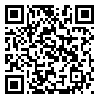BibTeX | RIS | EndNote | Medlars | ProCite | Reference Manager | RefWorks
Send citation to:
URL: http://journal.zums.ac.ir/article-1-231-fa.html
Background and Objective: Although patients with uncontrolled type 2 Diabetes mellitus(DM) despite conventional treatment with oral hypoglycemic agents eventually require insulin to achieve glycemic control, most of them reject use of insulin. To evaluate the efficacy of adding acarbose to full doses of conventional oral hypoglycemic agents on the metabolic control of the patients this study was designed.
Materials and Methods: In this uncontrolled follow-up study, 20 patients with type 2 DM and persistent poor glycemic control despite maximal doses of sulfonylurea and metformin were recruited to receive additional treatment with acarbose. Insulin therapy was rejected by all the patients and 12 weeks of dietary reinforcement and supervision for their diet and exercise programs failed to improve their glycemic control. An active treatment period with acarbose 100 mg thrice daily was fallowed by a 12-week of placebo. Efficacy was assessed by changes in HbA1c, fasting and 2-h postprandial plasma glucose and fasting plasma lipid levels.
Results: Acarbose treatment was associated with significantly greater reductions in HbA1c (-1.3 +/- 0.2% vs. placebo 0.2 +/- 0.1%, P = 0.038), Fasting Plasma Glucose(FPG)(-25.3 +/-10 mg/dl vs. placebo 10 +/- 6mg/dl , p:0.019), 2-h postprandial glucose (-24 +/- 8 mg/dl vs. placebo 15+/- 7.5 mg/dl, P :0.001) and body mass index(BMI) (-0.5 +/- 0.32 kg/m² vs. placebo 0.42 +/- 0.29 kg/ m², P: 0.01). There were no significant changes in plasma lipids levels.
Conclusion: In patients with type 2 DM inadequately controlled on conventional oral agents, acarbose resulted in beneficial effects on glycemic control and mean body weight. Additional use of acarbose can be considered as a useful alternative in such patients if they are reluctant to accept insulin therapy.Background and Objective: Although patients with uncontrolled type 2 Diabetes mellitus(DM) despite conventional treatment with oral hypoglycemic agents eventually require insulin to achieve glycemic control, most of them reject use of insulin. To evaluate the efficacy of adding acarbose to full doses of conventional oral hypoglycemic agents on the metabolic control of the patients this study was designed.
Materials and Methods: In this uncontrolled follow-up study, 20 patients with type 2 DM and persistent poor glycemic control despite maximal doses of sulfonylurea and metformin were recruited to receive additional treatment with acarbose. Insulin therapy was rejected by all the patients and 12 weeks of dietary reinforcement and supervision for their diet and exercise programs failed to improve their glycemic control. An active treatment period with acarbose 100 mg thrice daily was fallowed by a 12-week of placebo. Efficacy was assessed by changes in HbA1c, fasting and 2-h postprandial plasma glucose and fasting plasma lipid levels.
Results: Acarbose treatment was associated with significantly greater reductions in HbA1c (-1.3 +/- 0.2% vs. placebo 0.2 +/- 0.1%, P = 0.038), Fasting Plasma Glucose(FPG)(-25.3 +/-10 mg/dl vs. placebo 10 +/- 6mg/dl , p:0.019), 2-h postprandial glucose (-24 +/- 8 mg/dl vs. placebo 15+/- 7.5 mg/dl, P :0.001) and body mass index(BMI) (-0.5 +/- 0.32 kg/m² vs. placebo 0.42 +/- 0.29 kg/ m², P: 0.01). There were no significant changes in plasma lipids levels.
Conclusion: In patients with type 2 DM inadequately controlled on conventional oral agents, acarbose resulted in beneficial effects on glycemic control and mean body weight. Additional use of acarbose can be considered as a useful alternative in such patients if they are reluctant to accept insulin therapy.
دریافت: 1387/3/23 | پذیرش: 1393/4/8 | انتشار: 1393/4/8
| بازنشر اطلاعات | |
 |
این مقاله تحت شرایط Creative Commons Attribution-NonCommercial 4.0 International License قابل بازنشر است. |




